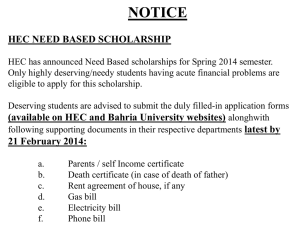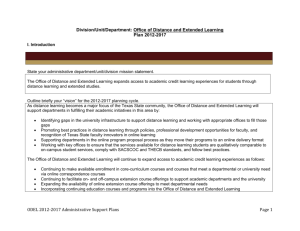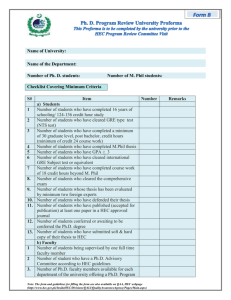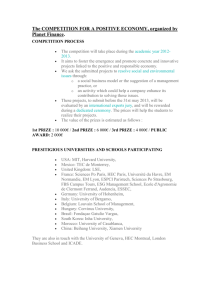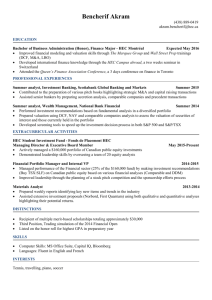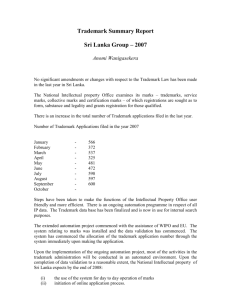REPUBLIC OF RWANDA Higher Education Council (HEC) P.O. BOX
advertisement
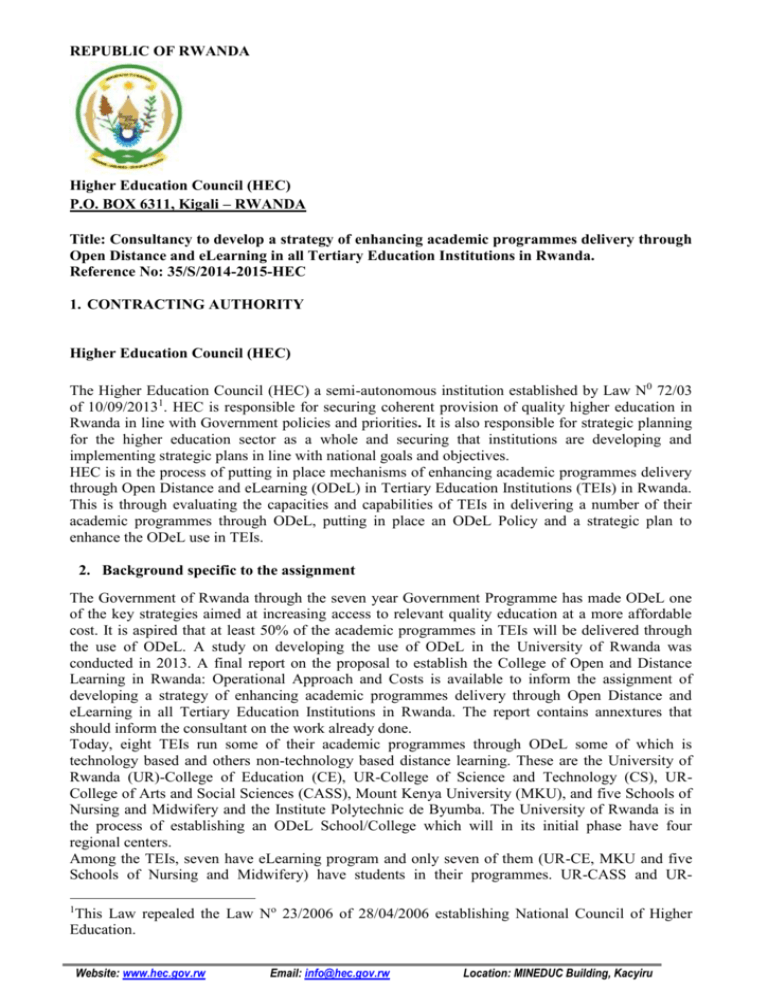
REPUBLIC OF RWANDA Higher Education Council (HEC) P.O. BOX 6311, Kigali – RWANDA Title: Consultancy to develop a strategy of enhancing academic programmes delivery through Open Distance and eLearning in all Tertiary Education Institutions in Rwanda. Reference No: 35/S/2014-2015-HEC 1. CONTRACTING AUTHORITY Higher Education Council (HEC) The Higher Education Council (HEC) a semi-autonomous institution established by Law N0 72/03 of 10/09/20131. HEC is responsible for securing coherent provision of quality higher education in Rwanda in line with Government policies and priorities. It is also responsible for strategic planning for the higher education sector as a whole and securing that institutions are developing and implementing strategic plans in line with national goals and objectives. HEC is in the process of putting in place mechanisms of enhancing academic programmes delivery through Open Distance and eLearning (ODeL) in Tertiary Education Institutions (TEIs) in Rwanda. This is through evaluating the capacities and capabilities of TEIs in delivering a number of their academic programmes through ODeL, putting in place an ODeL Policy and a strategic plan to enhance the ODeL use in TEIs. 2. Background specific to the assignment The Government of Rwanda through the seven year Government Programme has made ODeL one of the key strategies aimed at increasing access to relevant quality education at a more affordable cost. It is aspired that at least 50% of the academic programmes in TEIs will be delivered through the use of ODeL. A study on developing the use of ODeL in the University of Rwanda was conducted in 2013. A final report on the proposal to establish the College of Open and Distance Learning in Rwanda: Operational Approach and Costs is available to inform the assignment of developing a strategy of enhancing academic programmes delivery through Open Distance and eLearning in all Tertiary Education Institutions in Rwanda. The report contains annextures that should inform the consultant on the work already done. Today, eight TEIs run some of their academic programmes through ODeL some of which is technology based and others non-technology based distance learning. These are the University of Rwanda (UR)-College of Education (CE), UR-College of Science and Technology (CS), URCollege of Arts and Social Sciences (CASS), Mount Kenya University (MKU), and five Schools of Nursing and Midwifery and the Institute Polytechnic de Byumba. The University of Rwanda is in the process of establishing an ODeL School/College which will in its initial phase have four regional centers. Among the TEIs, seven have eLearning program and only seven of them (UR-CE, MKU and five Schools of Nursing and Midwifery) have students in their programmes. UR-CASS and UR1 This Law repealed the Law No 23/2006 of 28/04/2006 establishing National Council of Higher Education. Website: www.hec.gov.rw Email: info@hec.gov.rw Location: MINEDUC Building, Kacyiru COSTEC do not currently have eLearning students. UR-CASS and five Schools of Nursing and Midwifery use the MOODLE (Modular Object-Oriented Dynamic Learning Environment) platform. UR-COSTEC has four different platforms, three teleconferencing rooms, two different Internet Service Providers (ISP), which makes the program available and stable (during the downtime or maintenance of other platforms. It means that only 21% of the TEIs deliver some of their academic programmes through ODeL. Even in this case, only a handful of academic programmes are run through ODeL. The TEIs that have some of their academic programms run through ODeL use the following platforms: MOODLE platform. The free software for eLearning, also known as eLearning Management System, or Virtual Learning Environment (VLE) was developed in PHP (Front End) and MySQL (Back End), and it is platform independent. Learning MIS which was built in-house by the College of Science and Technology (URCST) with applications developed in partnership with KOICA. e-COURSE a platform used at UR-CST by a Chinese company called HUAWEI. e-CLASSROOM: This is a teleconferencing application also donated by HUAWEI. Learning Management Information System (LMIS) is the MIS used to post courses’ materials online. Tele-education: this is a video conferencing system used in UR-CE in partnership with Pana-Africa Networks. African Virtual University (AVU): phase 2 to kick off soon under UR. The AVU headquarter established in UR-CST. Enhancing provision of academic programmes through ODeL has the following advantages. providing an opportunity to potential students who are unable to have the opportunity of taking advantage of conventional mode of learning or having other commitments that cannot allow them to attend to classes on a full time basis to organize their time to study through ODeL. Offering degree courses, diplomas and post graduate programs for the benefit of the working population without them quitting their jobs for studies. Serving as a source of continuing education. Allowing students to pursue any degree, anytime, anywhere convenient to the learner. It is flexible in terms of age, study center, time limit, and time for examinations. This can be beneficial to run academic programmes in different regions without necessitating to establish a campus in the area. Having a cost-effective academic programs for students that may not afford an expensive conventional academic programmes. HEC has noted that the following challenges exist vis-à-vis ODeL use: Some academic staff do not consider eLearning as part of their workload. MOODLE server is very slow and sometimes completely down which affects studies and the servers need to be upgraded and increased depending on the number of student intake Schools of Nursing and Midwifery have teleconferencing equipment but health centers and all hospitals do not which affects the learning. Website: www.hec.gov.rw Email: info@hec.gov.rw Location: MINEDUC Building, Kacyiru Some hospital do not give permission to students to attend the face-to-face sessions. The online learning sometimes fails due to the downtime of MOODLE platform. Additional UPS should be availed to prevent electricity interruption in the system. In most cases, there are insufficient facilities (in many cases teachers use their own laptops and students have substandard laptops). Some TEIs have a small amount of internet bandwidth and this affects their teleconferencing usage. Some TEIs do not have power generators and this can affect online studies when grid power is unavailable. Interactive CDs facility is still lacking in all eLearning programs yet it is very important to some locations where the internet is not available. Some academic staff lack training in preparation of digital content and in student support. Sometimes there is intermittent virtual classes due irregularity of delivery through teleconferencing technologies. It is against this background that HEC seeks to engage a consultant to establish the level of readiness of TEIs to introduce or enhance the academic programmes delivery through ODeL, assess the strengths and weakness of TEIs vis-à-vis ODeL usage, and to develop a strategic plan and ODeL Policy. 3. Purpose of the Consultancy The purpose of this consultancy is to design a strategic plan for enhancing the academic programmes provision though ODeL in all TEIs with an aim of increasing access to relevant quality tertiary education that is more affordable to students whereby the target is to have at least 50% of academic programmes run under ODeL by 2017. Also, the consultant will design an ODeL Policy guide TEIs in running some of their academic programmes through ODeL. 4 Specific Objectives The specific objectives of the consultancy are: a) Find out the strengths, weaknesses, and technician & administrative challenges of academic programmes delivery through ODeL in all TEIs. b) Find the level of preparedness of TEIs for delivering some of their academic programmes through ODeL. c) Find out which academic programmes can in a viable manner be delivered through ODeL in all TEIs. d) Find out the staffing, technical (including e-learning platform), physical infrastructure and other requirements of establishing an ODeL mode of academic programmes delivery in all TEIs. e) Explore the challenges in digital content development in TEIs and strategies to overcome the challenges. f) Find out the budget requirements for ensuring all that TEIs are able to deliver some of their academic programmes through ODeL. For each TEI, after finding out the budget requirement to introduce academic programmes through ODeL or enhance them where they already exist, the Consultant will find out from the TEI the possibility of providing for the required budget. Website: www.hec.gov.rw Email: info@hec.gov.rw Location: MINEDUC Building, Kacyiru g) Design a Strategic Plan that provides viable strategies to enhance academic programmes delivery through ODeL, with an aim of achieving the 50% target of academic programmes of TEIs to be run through ODeL by 2017. This should include the indicative budget involved. h) Design a Policy to govern ODeL usage in TEIs in Rwanda. This should include an implementation plan. 5 Main activities (scope of services) Duties include: Exploring the rationale of delivery of academic programmes through ODeL in Rwanda. Examining the envisaged impact of running some academic programmes through ODeL in TEIs. This will reflect on access, relevance and quality of tertiary education. Identifying strengths, weaknesses, and technician & administrative challenges of academic programmes delivery through ODeL in all TEIs, Establishing the level of preparedness of TEIs for delivering some of their academic programmes through ODeL. Examining both external and internal factors which may influence, facilitate or hinder delivery of academic prgrammes in TEIs. This includes staffing, technical (including elearning platform), physical infrastructure issues. Evaluate the challenges in digital content development in TEIs and strategies to overcome the challenges. Establish financial resources needed to enable the running of some of academic programmes through ODeL. A five year budget plan should be established as a way of implementing the identified strategies. Develop a Strategic Plan that provides viable strategies to enhance academic programmes delivery through ODeL, with an aim of achieving the 50% target of academic programmes of TEIs to be run through ODeL by 2017. This should include the indicative budget involved. Develop a Policy to govern ODeL usage in TEIs in Rwanda. This should include an implementation plan. In order to realise the above, the Consultant is required to among other things: a) Conducting the state of readiness of TEIs in running some of their academic programmes through ODeL, which exact programmes, and the time period they can start. b) For the eight TEIs that already have some of the academic programmes run through ODeL, find out how the practice can be enhanced to increase the number of academic programmes and students under the ODeL mode of delivery. c) Describe a platform that can be used which caters for: o Creating and uploading online course materials (text, audio, and video) o Opening forums o Putting students into small groups Website: www.hec.gov.rw Email: info@hec.gov.rw Location: MINEDUC Building, Kacyiru o Creating and uploading online tests o Chatting sessions o Monitoring students’ attendance o Monitor students’ participation o Enabling students to follow lessons o Enabling students to upload their assignments and test and enabling students chat sessions o Enabling students to do tests and other forms of assessments o User manual. o Infrastructure necessary to enable ODeL o Monitor students’ attendance; and o Monitor students’ participation. d) After evaluating the necessity, the consultant should advice on how to enhance partnership with national, regional, and international ICT training centers like: o Microsoft; o Cisco; o IBM; o Oracle; o Prometric (online testing centers) and o Pearson Vue (online testing centers). o Others (the Consultant to find out other possible partnerships) e) Develop a strategic plan including: o Rationale for adopting the usage of ODeL in TEIs o Mission, vision, and strategic goals o Methodology used in compiling the strategic plan o Current practices of usage of ODeL in TEIs o Strength, weaknesses, opportunities, and threats in using ODeL as a mode of delivery of academic programmes o Key challenges o Strategic framework for enhancing ODeL usage in TEIs including the strategic goals envisaged, priorities, outcomes, strategies achieving outcomes o Implementation of the strategic plan (the interventions, roles and responsibilities of stakeholders), coordination issues, risk analysis and mitigation strategies) Website: www.hec.gov.rw Email: info@hec.gov.rw Location: MINEDUC Building, Kacyiru o Monitoring and evaluation (indicators, evaluation process) o Cost and financing of the plan (the case for public TEIs, and case for Private TEIs) in terms of introducing/scaling up/enhancing ODeL usage in delivery of academic programmes. f) Design an ODeL Policy to include o The characteristics of academic programmes and modules. o Admission, registration and advanced standing o Number of students per academic staff o Assessment o Undergraduate final projects at honours level and masters dissertations, and PhD thesis o The conduct of examinations o Cheating o Examination boards o Progression between levels o Mitigating circumstances for a student who will be unable to sit for exams in regular times. o Awards o Rights and obligations of academic staff o Rights and obligations of students o Facilities required for e-learning, and for a blended approach. o Quality assurance systems and role of Management of TEIs, Faculty, Administrative Staff, and Students. o practices to ensure quality and diversity o Guidelines on academic regulations o Generic learning outcomes by level o Requirements for awards, distinctions and classifications o Guidelines on learning, teaching and assessment o The assessment strategy o The Academic and Support Staff Strategy o The Learning Environment Strategy o typical module materials, module arrangements and what is expected of the students o Access to career counselling enjoyed by other students that are in the conventional learning environment. Website: www.hec.gov.rw Email: info@hec.gov.rw Location: MINEDUC Building, Kacyiru o Accessing students services like student ID, socialisation, and extracurricular activities. o Students can have both supervised and non-supervised tests. o Calculating workload for the online teacher; o Measures to protect against possible student reputation/employers 'negative perception); o Mode of examination and their supervision: final exams, partial exams, assignments and other continuous assessment tests. 6 Project management The Consultant will report to the Director General of HEC 7 Methodology and work plan The methodology for this consultancy will include visiting each TEI to establish the status of academic programmes delivery through ODel, establishing technical and other requirements for an effective academic programme delivery through ODeL, talking to different stakeholders of tertiary education sector to establish their views and aspirations about ODeL, using various policies and regulations governing tertiary education/higher education and ensuring that adequate data/information is collected to enable the Consultant to develop a strategic plan and policy for enhancing academic programmes delivery through ODeL. This will include: (a) to prepare an inception report, detailing the scope of work, methodology and work plan required to achieve the consultancy’s expected results, specific objectives and expected outputs. The aim is to show how far the task to undertake is understood before proceeding with the consultancy work. (b) To design a data collection tool. This will be used to collect data from TEIs. (c) to arrange for a wide series of consultations with the education sector stakeholders that include HEC, WDA, TEIs, and representatives from both public and private schools, higher education and training institutions in Rwanda, representatives from students associations. (d) to use various method of data collection that include focus group discussions and interviews to know the expectations of the stakeholders. (e) to develop timeline with specific activities for undertaking the consultancy. 8 The expected results The final report of the consultancy will address the following: (a) Provide a description of the concept of ODeL which should include the history and current international trends of use of ODeL in TEIs, requirements (technical facilities and equipments, staffing, content, and systems), and challenges of academic programmes delivery via ODeL and the likely impact on quality and relevance of tertiary education. (b) Document the status of preparedness of TEI to deliver academic programmes through ODeL including their strengths, weaknesses and challenges of the existing academic programmes run through ODeL and how the weaknesses and challenges can be overcome. (c) Compile a draft strategic plan that enables to achievement of the purpose and objectives of this consultancy assignment. Website: www.hec.gov.rw Email: info@hec.gov.rw Location: MINEDUC Building, Kacyiru (d) Compile a draft policy to govern ODeL and to ensure the enhancement of academic programme delivery through ODeL aiming at increasing access to quality and relevant tertiary education that is more affordable to students. 9 Expected outputs/Milestones The consultant is expected to: (a) Discuss the terms of reference with HEC management before embarking on the tasks so as to make sure that both client and consultant agree on the tasks to be accomplished, the duration and the milestones. (b) Present an inception report after 7 days of signing the contract detailing how the work will proceed. This should include the tools to use in data collection. (c) Organize for consultation workshops with stakeholders. (d) Conducting focus group discussions and interviews. (e) Collect the data using the validated scientific tool. (f) Synthesis data collected and writing the report clearly giving the rationale of academic programmes delivery through ODeL, requirements to enhance the ODeL systems of academic programmes delivery, strategic plan and policy for ODeL usage in all TEIs. (g) Presentation of the report, and draft Strategic Plan and Policy to HEC Management. (h) Present the report and draft Strategic Plan and Policy to a validation workshop which will be organized by the consultant. (i) Submit to HEC management the final report and draft Strategic Plan and Policy after including in all recommendations from the validation workshop. 10 Reports and time schedule The consultant is expected to provide: (a) Inception report; one week after the signing of the contract. The presentation will be made to the HEC Management. (b) interim progress report after half the period of the consultancy so as to get comments from the Directorate of Policy, Research, and Planning of HEC and the Deputy Director General in charge of ODeL in REB/MINEDUC. (c) first status report after collecting all data so as to get comments from the Directorate of Policy, Research, and Planning of HEC and the Deputy Director General in charge of ODeL in REB/MINEDUC. (d) second status report after making analysis of the data so as to get comments from the Directorate of Policy, Research, and Planning of HEC and the Deputy Director General in charge of ODeL in REB/MINEDUC. (e) draft status the report on the use of ODeL in TEIs, strategic plan, and policy after including the recommendations so as to get comments from HEC Management. (f) Presentation of the draft report, Strategic Plan, and Policy to stakeholders for validation. Website: www.hec.gov.rw Email: info@hec.gov.rw Location: MINEDUC Building, Kacyiru (g) final report, Strategic Plan, and Policy after incorporating all recommendations from the validation workshop. 11 Required Profile to Undertake the Consultancy The consultant shall demonstrate a very good knowledge of tertiary education in general and higher education in Rwanda in particular, having a minimum five years working experience in higher education and preferably having a PhD. Also, the consultant or members of his/her team is (are) expected to provide evidence for experience in designing a process of learning using ODeL methodology, planning education programmes and content delivery through ODeL, and designing of a computerised student learning/management systems or similar assignments. The consultancy requires firms/institutions registered to operate in Rwanda, and possessing working experience in the area of higher education, policy, strategic management, and ODeL. Preference will be given to firms/ Institutions with proven relevant experience in undertaking a task of similar magnitude, and shall preferably, among others have, the following expertise and qualifications/experience; (a) A team leader to provide leadership to the consultancy with at least a Doctoral degree and methods of evaluating quality of higher education and in particular development of ODeL systems as a mode of academic programmes delivery. The Consultant shall have an experience of at least five (5) years in the area of higher education plus evidenced knowledge of development of ODeL systems in a tertiary education sector. The team leader must have: proven experience in higher education. In-depth and proven knowledge of assessment of ODeL. (b) The consultancy must be supported by a team of at least two experts; One with a relevant Masters degree in IT/Computer Science, or IT related disciplines with proven experience in the area higher education policy development. Another with a relevant Masters degree with proven experience in the area of higher education institutional audit. The consultancy team will also be required to demonstrate: i. Excellent research, writing and presentation skills. ii. Fluency in English is a must. iii. Strong computer skills and analytical skills with ability to write and review technical reports. iv. Familiarity with the education system in Rwanda and the region. Team composition and task assignments including the list of professional staff (indicating their education levels, key qualifications, experience, and time schedule on the assignment). 12 Timeframe for consultancy The consultant will be required to undertake the consultancy within 60 calendar days to produce the required outputs outlined above. 13 Coordination The consultant will report to HEC. The consultant is at liberty to get support from HEC in identifying and contacting stakeholders in this consultancy. HEC will provide: Website: www.hec.gov.rw Email: info@hec.gov.rw Location: MINEDUC Building, Kacyiru Prior studies conducted by HEC and MINEDUC in the field of ODeL in higher education. Laws, Regulations, and Policies governing higher education. Statistics on higher education in Rwanda. Support the consultant in contacting stakeholders. Personnel to make a follow-up of the work the consultant is doing. Photocopying and printing services for documents needed in this consultancy work. 9. EXPRESSION OF INTEREST EVALUATION An evaluation committee will evaluate Expressions of Interest based on following criteria (including administrative documents): Experience of the firm in conducting similar assignments during the last five years (proven by certificates of good completion). Staff experience in conducting similar assignments during the last 4 years (proven by their signed CVs). Firm’s methodology and work plan to carry out the activity in the duration provided for this assignment. Actual Financial capacity and stability (proven by audited financial statements) Expression of Interest letter indicating full address of the firm; General presentation of the firm including complete address, Country of origin, name and background of the firm (firm must submit sufficient information on its history to help with the review of the EOI), owner of the firm and years of experience etc. Trading license or other proof of firm registration as a legally recognized business entity in his country of origin; For the local firms, proofs of registration with Rwanda Social Security Board and Rwanda Revenue Authority (VAT certificate and tax clearance still valid); Interested Firms should provide the necessary documents that will attest that they are qualified to perform the services (i.e. brochures, description of similar assignments undertaken, etc.) 14 Commencement date and period of implementation The intended commencement date will be from the date of signature of the contract. 15 Submission of applications Foreign registered firms willing to carry out this assignment can only do so under those conditions such as time for preparing proposals, taxes, currencies and methods of payment. The Expression of Interests must be submitted either by email or by hand (in a sealed envelope) to the following address not later than 14/11/2014 at 10:00 am local time: Higher Education Council (HEC), Ministry of Education (MINEDUC) Building, Ground floor to Procurement Office or electronically at info@hec.gov.rw All expressions of interest submitted in hard copies must be in triplicate. Any additional information about this Request of Expression of Interest, if required, may be obtained from the e-mails: obatamuriza@hec.gov.rw and fmugisha@hec.gov.rw abaguma@hec.gov.rw Website: www.hec.gov.rw Email: info@hec.gov.rw Location: MINEDUC Building, Kacyiru From 07.00 a.m. to 17.00 pm local time. Done at Kigali, 29th October 2014 Dr. Innocent S. MUGISHA Executive Director Website: www.hec.gov.rw Email: info@hec.gov.rw Location: MINEDUC Building, Kacyiru
